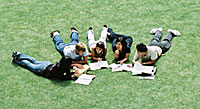 |
|
 |
| |
| |
| |
| |
| |
| |
| |
Campus: Kensington Campus
| |
| |
Career: Postgraduate
| |
| |
Units of Credit: 8
| |
| |
| |
| |
Contact Hours per Week: 2
| |
| |
| |
| |
| |
 |
|
 |
Description
Offers deep insights into the political nature of our educational institutions. The implications of this research are of great benefit to educational administrators as well as students of educational management and organisations. Explores the relationship between theory and practice with direct reference to the political nature of policy making and policy implementation. Critically reviews the ideological implications of the power of political play in education policy and draws upon the work of theorists who have examined the relationship between knowledge and power.
Note: This course may be taken as an elective in the Master of Educational Administration program.
Learning Outcomes
On successful completion of this course, students should be able to:
- Gain a deeper insight into the political nature of educational institutions
- Apply the knowledge gained by this course in fields of educational administration, educational management, policy construction and research
- Examine the relationship between theory and practice with direct reference to the political nature of policy making and policy implementation
- Critically review the ideological implications of the power of political play in education hierarchy
- Examine the politics of education in the light of globalization and forces of technological change
- Articulate the varied discourses of power within the educational ladder and the politics of social mobility
- Assess educational governance in the light of social justice and equality of opportunity and access
- Assess the Role of Australian Federal Government & relationships with State Governments in educational policies and funding
- Evaluate the changing political climates of economic rationalism and human capital theory underlying the reform of learning and teaching institutions
- Gain knowledge in the field of educational networks, alliances and agencies
- Examine the power of the media and public opinion on educational issues
- Examine the management culture and gendered positions
- Gain knowledge in the policy making process
- Acquire skill in political discourse analysis of policy documents
- Examine the politics of curriculum and knowledge; curriculum reforms and matriculation changes
- Gain knowledge in the political and historical evolution of policies for for specific policies, such as, Indigenous Education, Non- Racist and Multicultural Policies
- Establish a clear understanding of the nature of politics in educational fields.
Assessment
- Essay or project - 50%
- Weekly seminar readings and critique - 20%
- Seminar presentation - 30%
|

